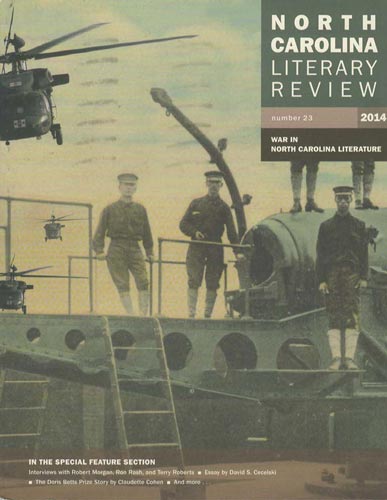North Carolina Literary Review – 2014
The North Carolina Literary Review is serious business, filled with substantial articles, interviews, poems, and stories that will be cited and remembered beyond the pleasure of reading that so many good literary journals offer. Moreover, there is a welter of photographs and art work, almost too much to take in. This is not an issue to pass on to a friend, but rather to shelve in one’s permanent library. The North Carolina Literary Review is serious business, filled with substantial articles, interviews, poems, and stories that will be cited and remembered beyond the pleasure of reading that so many good literary journals offer. Moreover, there is a welter of photographs and art work, almost too much to take in. This is not an issue to pass on to a friend, but rather to shelve in one’s permanent library.
Rebecca Godwin’s interview with Robert Morgan leads off. Morgan speaks about the roots of his preoccupation with war and the work that has grown out of it—for example, the novel Brave Enemies, set in the South during the Revolutionary War; Civil War stories like “Little Willie” and A Brightness New and Welcoming”; World War II narratives, such as the novella “The Mountains Won’t Remember Us and his novel The Road from Gap Creek; and his reading and writing about other war writers like Ernest Hemingway. “Only fools would start wars. Yet we continue to do just that. And when wars are over, the damage to millions of lives lingers,” he concludes.
John Gruesser’s assessment of the African American author and magazine publisher, James E. McGirt, explores his writing about the American conflicts in Cuba and the Philippines. In his poetry and fiction, McGirt, perhaps surprisingly, did not take an anti-colonial stance, but used the foreign settings as an opportunity to depict black military heroism, social acceptance, and superiority over whites.
The internment of 2,300 German nationals at a North Carolina spa during World War I forms the backdrop for the 2012 novels of Ron Rash (The Cove) and Terry Roberts (A Short Time to Stay Here). Both have a lot to say about their books, historical novels, and war in Zackary Vernon’s excellent joint interview with them. Another lovely nugget of local history shines in David S. Cecelski’s “’The Voice of the Shipyard’: Arthur Miller in Wilmington, North Carolina, 1941,” about Miller collecting sound recordings there on the eve of U.S. involvement in World War II before he became a prominent playwright.
Claudette Cohen delivers the most disquieting portrayal of the effects of war in her short story, “The Mayor of Biscoe,” winner of the 2013 Doris Betts Fiction Prize. The narrator, a soldier with PTSD, is way past worrying about clarity, so there’s a wonderful jumble to his horrible and poignant tale, which he is compelled to relate, as the Ancient Mariner must tell his. “Most folks know to keep death from them by at least six feet. To live, I’ve had to hold death to me until my heart’s turned to white ash,” he says, giving us the kernel of his story, and the kernel of war.
The second half of the issue, “Flashbacks, Echoes of Past Issues,” swings away from the war theme, which, nevertheless, continues to resonate through other subjects. This section includes Paul Baggett’s essay on author Charles W. Chesnutt, particularly his 1901 novel, The Marrow of Tradition, and the ‘province of literature,’ a term from Chesnutt’s journals:
The negro’s part is to prepare himself for social recognition and equality; and it is the province of literature to open the way for him to get it—to accustom the public mind to the idea.
James Applewhite contributes two poems, “Images Upon Waking” and the lofty “Science Fictions.” Later we come upon four finalists for the 2013 James Applewhite Poetry Prize. My favorite was the Honorable Mention entry, Hannah Bonner’s spare and supple, “Fox”:
Even through the fog
you can see her, the red
streak of torso, tail,
a forecast of autumn
Zackary Vernon also contributes an amusing piece on Allan Gurganus’s annual Halloween Haunted House, in which are performed skits designed to épater la bourgeoisie and to comment on “the horror show of American politics.” Annie Frazier’s short story “Sakura” was a Doris Betts Fiction Prize Finalist. As in Cohen’s story, the power of a first-person narrator, here an elderly Japanese woman, obliterates the distance between author, reader, and subject, transporting us to a place we’ve never been, a place that only exists on the page and yet feels so real that we could walk around it blindfolded after shutting the magazine.
All of the material here is related to North Carolina and the variety extends to critical theory-based analyses, which, as usual, drive a wedge of jargon between reader and text. The overall design is busy with changing typefaces, different backgrounds, photographs quite reduced in size, and cartoon drawings, so that at times I felt as if I were trying to read a novel on Facebook. Nevertheless, this journal, out of East Carolina University, is a keeper.





